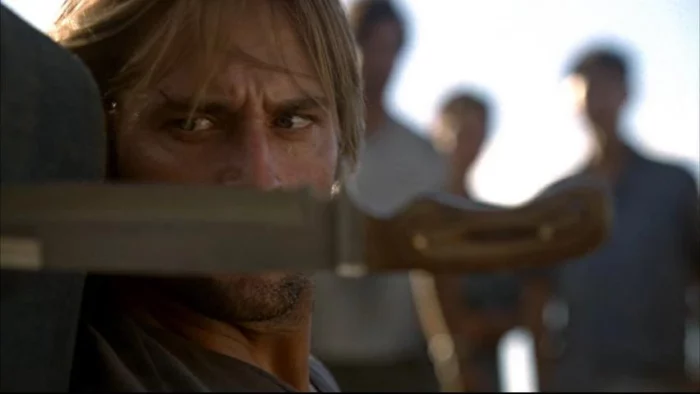The following contains spoilers for the whole series and the character arc of John Locke, particularly for the events of “Walkabout” Lost, S1E4, (written by David Fury and directed by Jack Bender) which first aired on ABC in the United States on October 13, 2004.
“Walkabout” begins, as so many episodes of Lost do, with a close up of an opening eye. The eye in this case being that of John Locke (Terry O’Quinn). Locke who, thanks in large part to O’Quinn’s command of the camera even when he is in the background, had already established himself as a fan favorite, then becomes the main focus of one of the fundamental episodes of the entire series.
In the two previous episodes, the two-part pilot and “Tabula Rasa,” Damon Lindelof and the other creators had already created the formula that the show would follow throughout its run. The characters were well established and the mythos and mystery were set. We already had the basic idea that the philosophical John Locke would be the counterweight to action-oriented Dr. Jack Sheppard (Matthew Fox). One was “the man of science” and the other “the man of faith.”
But it was really with “Walkabout”—and with the focus on Locke—that the series showed it was going to be much deeper and more interesting than expected. We get to see why Locke is so insistent upon his view of the island as paradise, and the experience changes everything. Once that eye opens, the camera shifts to a view from below and shows us Locke slowly twitching his toe. This is foreshadowing for the reveal at the end of the episode, but it flows so naturally. Even now, having known what this means for this character for 18 years, it seems like such a natural reaction. O’Quinn never gives anything away, but he also doesn’t hide anything. This pitch-perfect reaction, a twitching toe, a slight widening of the eyes, and then, as carnage and destruction rains down around him, a relieved smile, tells us more about the character of John Locke than other shows accomplish in years of storylines with their characters. Even though, in the first viewing, we don’t even know half of the story of what is happening.
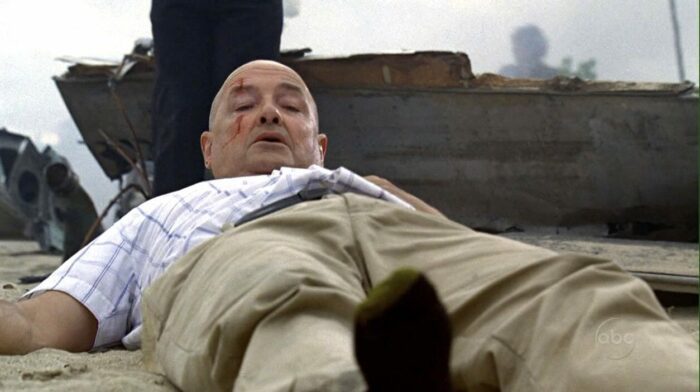
The best part of the episode isn’t the big twist revealed at the end—that this powerful and very mobile character had just prior to Oceanic flight 815 been confined to a wheelchair—though that was revelatory and shocking at the time. It’s that the confident and commanding John Locke had in that same previous life been a lonely, nerdy, office worker. The flashbacks would become among the most memorable and unique elements of the show. (As would the flash-forwards and flash-sideways, but, as of Lost S1E4, those developments were still years in the future.) Fascinatingly, thinking back on “Walkabout” I remember the flashbacks as the main focus, but there were only four and each of them is very short. But each is necessary and revelatory.
The first flashback starts as the episode does with a close-up of Locke’s eye, though we quickly pull out to see that he is on the phone. The person on the phone refers to him as “Colonel Locke” and we start to think that he may have been the badass he plays on the Island. But then the camera pulls even further back and we see he is stuck at a cubicle, in what looks like a terrible and life-draining office. Then, as we pull back another step, we see he is picked upon by his terrible boss. The boss calls him out for taking personal calls at work and then, in case the allusion to Office Space hasn’t been clear enough, he orders Locke to provide him with TPS Reports. As the camera pulls away again, we see Locke as a small and broken man.
The second flashback is more of the same, with Locke and his friend revealing that the phone call was about a lunchtime rendezvous with an office friend about a war game they are playing. The fantasy is not limited to the game though, as it is in this scene that Locke mentions both his plan to go on a trip and his girlfriend, Helen.
And it is the third flashback where we meet Helen that is probably the saddest and most revelatory. As Locke lays on his bed and talks to Helen on the phone, it is clear immediately that she is not into him but only later does it become clear why.
Helen, it turns out, is not Locke’s girlfriend, she is a paid phone companion, the exact parameters of the “relationship” thankfully left unexplored, but she only speaks to Locke because he pays for the time. Then, as he happily pushes for her to go on the walkabout with the second ticket he bought for her, she has to end even that. When she tries to get off the phone, Locke pushes back saying he will pay for more time, and she hangs up. Even the paid companion cannot stand to spend more time with him, and he is utterly and ultimately alone.
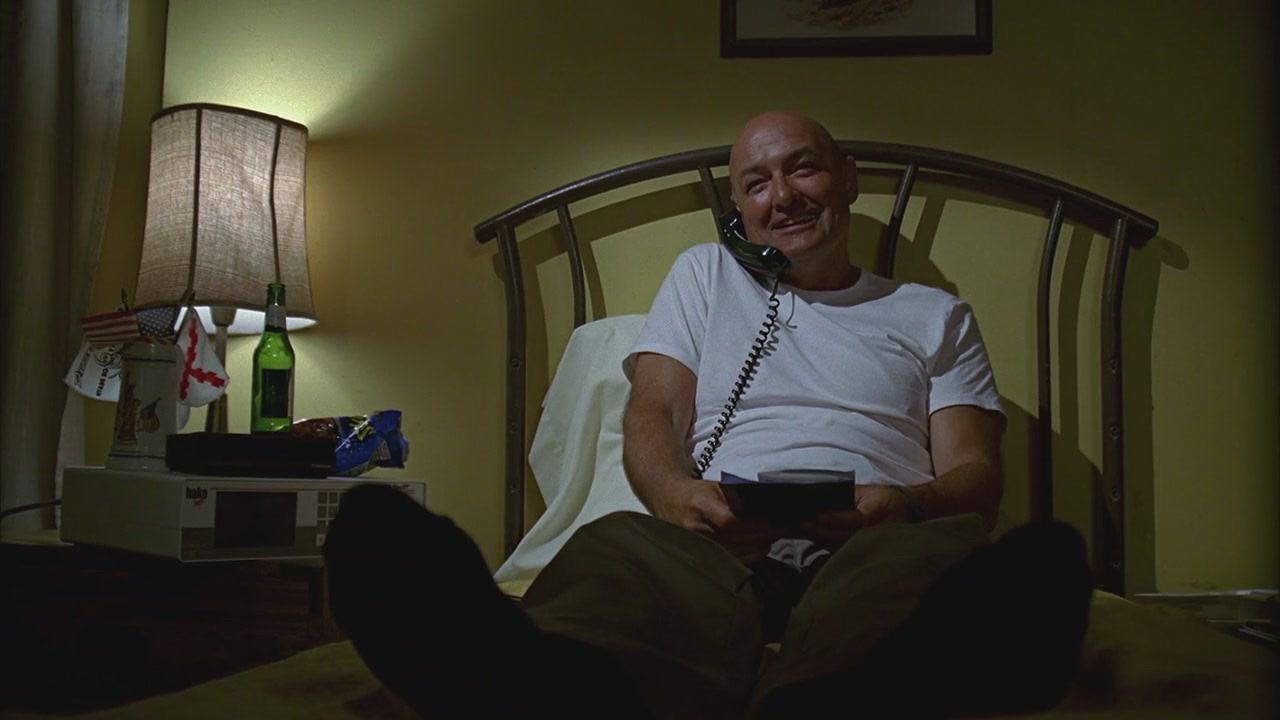
Finally, we come to the final flashback. Locke is in Australia, trying to convince a guide that he should still be allowed to go on a walkabout. We join the discussion already in progress, and we know at an instant that Locke will lose. As he gets more and more heated and starts to scream that this is his “destiny” it is clear that this man is completely “lost”, and finally the guide gives up. He leaves Locke alone in the office as he tries to kindly let Locke know that the walkabout is dangerous and something he can’t do. “Don’t tell me what I can’t do!” Locke screams repeatedly as the camera pulls out to reveal his wheelchair. He has not been able to walk for four years, and the reasons for that will turn out to be even sadder than we realize. But as of now, he is broken, mentally and physically, and alone. This man needs a miracle.
All of this contrasts with the Locke we have seen on the island. Locke, unlike the others, is hardly fazed by the dangers posed. His contrast to Jack cannot be more clear, or more important. Jack is the reluctant hero, though one who constantly likes to butt into everyone’s business and tell everyone what to do. Locke is the true believer, he thinks he is the central character in this story because the Island has informed him this is the case, first by restoring his legs and then by having the Smoke Monster look into his soul. (That this will lead to pain, death, and disappointment for Locke and for everyone else only makes it more poignant.)
Locke has been immediately transformed by this experience and has real evidence that validates his faith, which sets him in opposition to Jack and the others, though ultimately it will unite and change them all.
All of that focus on Locke would normally dominate an entire episode of television (and it certainly is the part that people think about when someone mentions Lost “Walkabout”) but one of the things that made Lost so great, and makes it so rewatchable, is that there is usually far more being explored than just the main focus. Later this would help seemingly minor characters like Hurley (Jorge Garcia) become key figures and fan favorites, but for these opening episodes, the focus is mostly on the way the survivors of the crash deal with those first few horrible days on the island.
Part of this, necessarily, ties into the Locke plotlines. Locke, Kate (Evangeline Lily), and Michael (Harold Perrineau) go out to hunt for boar in an attempt to provide food for the others. They go out in search of boar that had been rummaging through the bodies left on the plane, with Locke determined to use this as his true “walkabout.” Kate and Michael have other goals, and they lead to pretty quickly establishing the patterns that we will see from them throughout their time on the show.
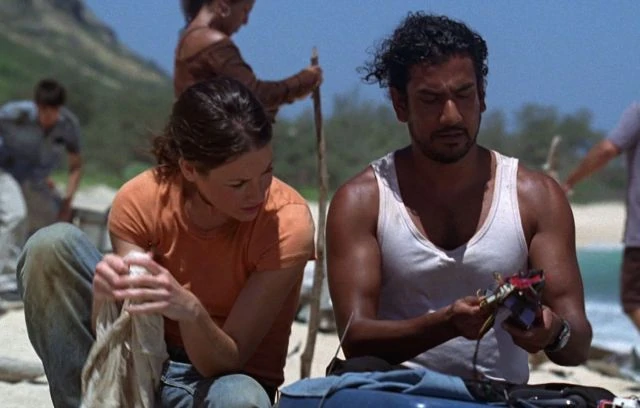
Kate is still in her early season “shifty” phase, her stated goal is to help Sayid (Naveen Andrews) place a transponder deeper inland so he can enhance the distress signal he picked up previously. Lily immediately embodies the traits that will make Kate loved or hated depending on your tastes in the years to come, playfully sassing Sayid, crying for Jack, and purring whenever Sawyer (Josh Holloway) is nearby. but the biggest takeaway is that, in every scene, she is just unnecessarily cagey. Michael’s problems and the issues that the creators have with doing right by the character are already evident. Why is he even on this quest? What is he doing here? Why did he leave Walt with Sun (Yunjin Kim) who at this point no one even knows can speak English? (Walt!)
Back on the beach where now, several days into the ordeal, everyone is still camped out. There are some really pressing, and disturbing, issues. After discovering the boars rooting through the bodies, Jack convinces the others that the only solution is burning the fuselage to get rid of the bodies. This leads to a bit of a religious and spiritual crisis among the others, with Sayid and Clare (Emilie de Ravin) the most vocal detractors. Jack, as always, refuses to listen to anyone else as he pushes people to do what he wants, but he is at least convinced to let the others give a bit of a service for the dead. This leads to a touching tribute as Clare and the others read the names of the departed and give them a bit of a sendoff. Then Jack ignites the plane and that connection to the lives they once had is severed.
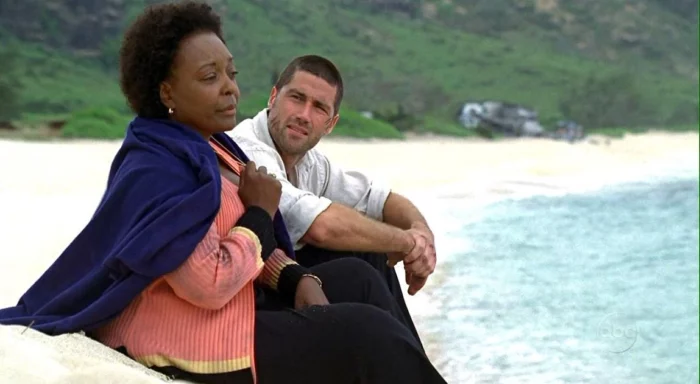
This sense of everyone else pushing Jack is mirrored in two other key ways during “Walkabout.” First, he is haunted by the (at times literal) ghost of his father. Jack keeps chasing the apparition, which will become the titular “White Rabbit” of the next episode, and of course, that leads him to encounter Locke, returning from his quest with a slain boar and new insight into his existence. But much more important for Jack, and for the viewer, is Rose (L. Scott Caldwell).
Rose had been seen previously, as she was one of the first people Jack saved after the crash. Now though, Rose is alone and contemplative, staring out at the ocean and not eating or speaking. Jack sits with her and their conversation is about love and loss, and forgiveness. Rose first releases Jack from his promise to sit with her until her husband returns. This is once again establishing the theme that the Island is a new start for all of them, they have to release each other from the promises and ideals that they had before they came to this Island. But then she says, “my husband is still alive,” and it plays at first as a delusion, but we will learn in time that it is anything but. Rose and Bernard will become the great love story on the Lost periphery, and the survival of the “Tailies” will become a key factor in the overall story for years.
All of that together, the well-developed and essential characters, the importance of the flashbacks, the vividly arresting plot, and the incredible performances are what make “Walkabout,” and really the entire show, work so well. In later seasons the plots may not be as tight and sometimes the flashbacks seem forced, but in the early going, everything just clicked. It was like some sort of mechanical marvel, or perhaps a miracle. And with Terry O’Quinn’s performance and the perfectly written scripts, you don’t need me or anyone else to tell you which one of those John Locke would think was the answer. And remember, now as always, “Don’t tell me what I can’t do!”
